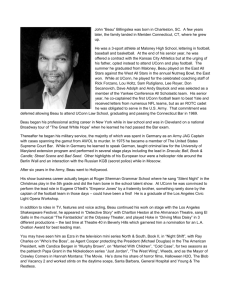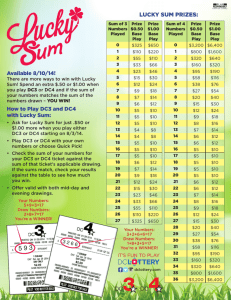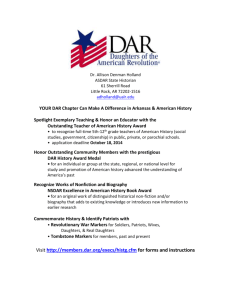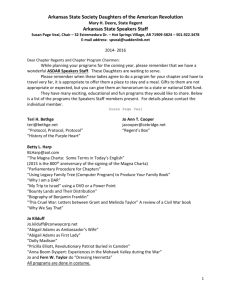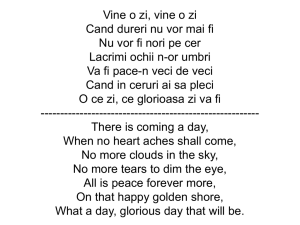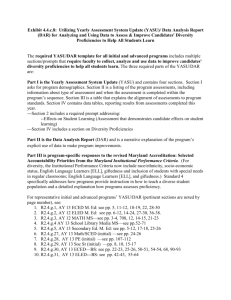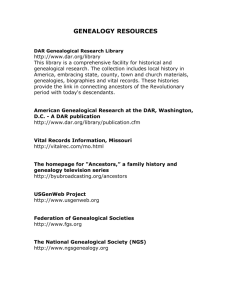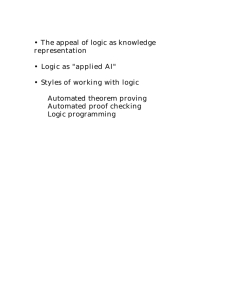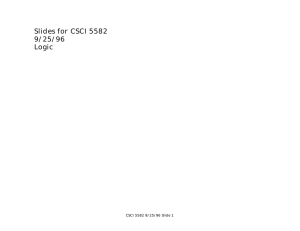bratu_an1_sem1_07.doc
advertisement
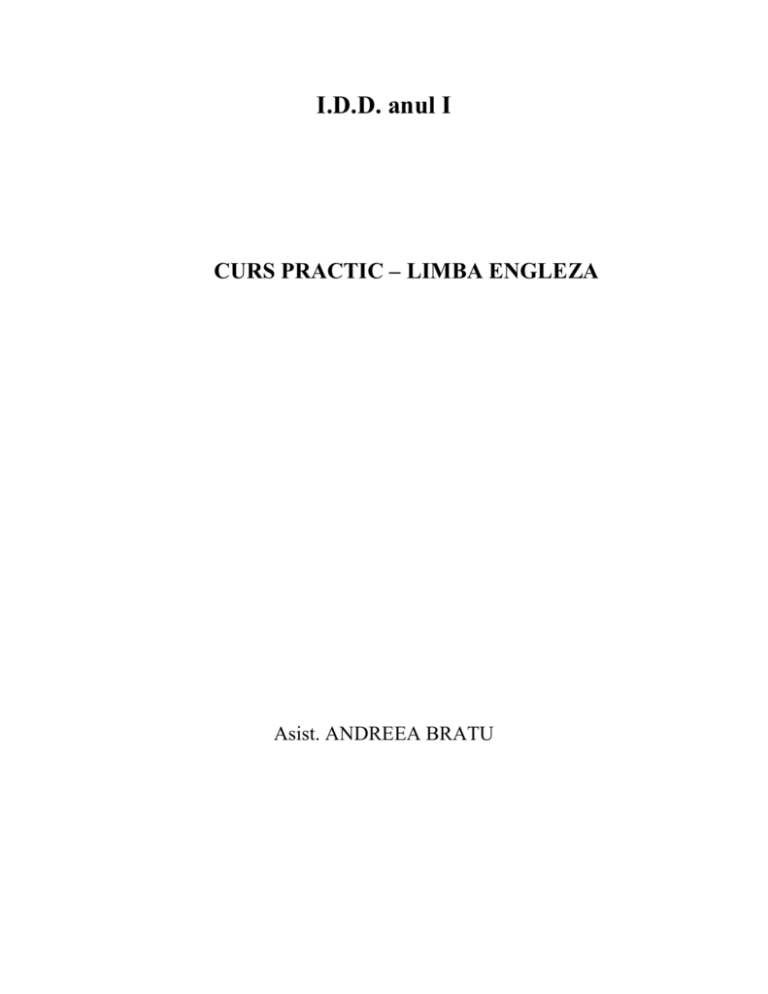
I.D.D. anul I CURS PRACTIC – LIMBA ENGLEZA Asist. ANDREEA BRATU The Verb Present Simple and Present Continuous; Social English Read the following text: Hello! My name is Rob Fellows. I come from Dundee, a town on the east coast of Scotland, but I am a student at Durham University, in the north of England. I’m studying French and German, and I can speak the languages quite well. I also know a little Spanish, so I can speak four languages. I’m enjoying the course a lot, but it’s very hard work! I live in Durham Castle, because the Castle is part of the University, with about thirty other students. The course started two years ago, ad I’m in my third year. After the course I’m going to work in France, but I don’t know where yet. a. b. c. d. e. f. g. h. Ask questions about Rob, using he/his: ----------- come from? What ------------ studying? How many --------------- speak? Is ------------ enjoying -------------? ------------------ live? ------------------ live with? ------------------ course start? What ---------------- after the course? 1. 2. 3. 4. 5. 6. 7. Match the questions and the answers: Where were you born? Are you married? What do you do? How many children do you have? How far is from Dundee to Durham? How do you come to school? Why are you learning English? a. b. c. d. e. Decide which is the correct verb form: Maria comes/ is coming from Spain. She speaks/ is speaking French, Spanish and English. Today she wears/ is wearing jeans and a T-shirt. She smokes/ is smoking twenty cigarettes a day. She doesn’t smoke/ isn’t smoking now. She is in class. a. By bus. b. I’m a teacher. c. Three. d. In Australia. e. Because I need it for my job. f. About 120 miles. g. No, I’m single. Ask and answer the following questions: a. Do you smoke? If you do, how many cigarettes do you smoke a day? Are you smoking now? b. Does your teacher smoke? Is he/ she smoking now? c. Do you wear glasses? Are you wearing glasses now? d. What are you wearing? What is your colleague wearing? 1. Match a line in column A with a line in column B: A. B. Could you fill it up, please? Yes, I’ll take the price off as well. How would you like it? Just one moment. I’ll look it up. It’s a present. Could you gift-wrap it, please? Shall I check the oil, too? Two lagers, please. Would you drop me near the station? Could you tell me where to get off? Could I have three tens and the rest in five? Could you tell me the code for Paris? Halves of pints? I’ll give you a lift if you like. Yes, I’ll give you a shout. 2. Write a sentence about the people: Country People adjective Italy Italian Italian Germany German German Brazil Brazilian Brazilian Spain Spaniard Spanish Holland Dutchman/ the Dutch Dutch Turkey Turk Turkish Sweden Swede Swedish Scotland Scot/ Scotsman Scottish The Italians make good cars. 3. Make a dialogue using the following suggestions: B. Answer the phone. A. Say who you are. Ask how A is. B. Reply. A. Ask what B is doing tonight. Invite her/ him to go out for a meal. B. You can’t tonight. Say what you are going to do. A. Suggest tomorrow night. B. You can’t. Say why. Suggest some time next week. A. You can’t. You’re going away on business. Suggest Saturday evening. B. Agree. A.+ B. Arrange a time and a place to meet. A. + B. Say goodbye. 4. Ask suitable questions for the following answers: a. b. c. d. e. There are three pictures on the wall. Jane lives near the railway station. Everybody knows the right answer. Our friends arrive tomorrow. We are coming next week, by car. How many… Where… Who… When… How… 5. Use the right form of the verbs in brackets: A. Tom: ………….. (you go) to the concert tonight? Susan: I ……………. (not go) because I ……………(have) tickets. Tom: I……………(want) to go because I usually …………..(have) a great time at concerts. Maria ………………(buy) tickets for her and for me. I can ask her to buy one for you, too. Susan: Thank you. You………………(be) so kind. I …………..(hope) we can go together. B. a. You can’t see Tom now, he ……………….(have) a bath. b. He usually ………………(drink) tea; today he……………(drink) coffee. c. What …………….( you do) in the evenings? d. I ….....................(play, usually) cards with my wife or watch TV. e. The fire …………..(smoke) terribly I can’t see across the room. f. Why ……………..(you taste) the milk? I …………..(taste) it because it …………..(smell) sour. g. Why ………… (you put on) your coat? I………….(go) for a walk, ……………(you come) with me? 6. Translate: a. De obicei beau ceai la micul dejun, dar astazi beau cafea cu lapte. b. Unde locuiesti ? c. C. Imi pace sa citesc o carte seara, inainte de a merge la culcare. d. Ce faci acum ? e. Liz merge in excursie in fiecare saptamana si se intoarce acasa duminica. f. Lui Mike nu ii place sa zboare cu avionul. g. Cred ca ai dreptate. 7. Choose the right verb : a. Mr. Faust (raises/rises) many different kinds of flowers in his garden. b. The student (rose/raised) from her seat and went to the blackboard. c. Mike (set/sat) a large vase with roses in it on the coffee table. d. Ana and Tom (set/sat) next to each other at the lecture yesterday. e. Every night before Mike goes to bed he (lays/lies) his clothes for the next day on a chair. f. When Alex (lay/laid) down to take a nap, he ended up sleeping for the whole afternoon. g. Dr. Roberts (hung/hanged) his diploma on the wall in his office. h. Romania (lies/lays) in the south-east of Europe. i. Where a re my keys? I (lay/laid) them here on the coffee table a few minutes ago. j. I (borrowed/lent) a book from the library. k. Can I (lend/borrow) your car tomorrow? l. Will you (borrow/lend) me some money? The Present Perfect and the Past Tense 1. Use the correct form of the verb: 1. It (snow) much last winter? 2. He (be) always so hard-working? 3. You (make) many mistakes in your last composition? 4. Betty (pass) her examination yesterday morning? 5. She (ask) him to help her? 6. They (finish) their holidays? 7. You (borrow) any books from the library last week? 8. Ben (see) her there by herself? 9. You (feed) the hens? 10. They (visit) this town two years ago? 2. Use the Present Perfect or the Past Tense: 1. He (write) two pages so far. 2. She (forget) to take her book with her. 3. They (leave) the village last week. 4. Ann (live) in Bucharest from 1968 to 1970. 5. They (not play) football since last week.6. John (start) to learn French last October. 7. Father (not come) home yet. 8. I cannot tell you where she is, as I (not see) her. 9. When you (receive) the letter from them? 10. They (become) very well-known now. 11. Much progress (be made) lately in nuclear science. 12. She never (teach) grammar before. 13. Years ago he (work) here but now he (move) to another factory. 14. This novelist (write) some very good plays, too, he (write) them in his youth. 15. The play (begin) half an hour late last night, so we (be) late for dinner. 3. Use the Present Perfect Simple or Continuous: 1. He not (be) in this restaurant for years. 2. She must tell us what she (read) since her last exam. 3. I (look) for the pen everywhere, but (not find) it. 4. You (run) too fast. Stop and rest a little. 5. She (sit) in that armchair since you left. 6. I (know) him since he was a child. 7. My friend (teach) in that school since 1966. 8. They (build) that block-of-flats for several months, but (finish) only half of it. 9. He (not come) yet but his wife already (arrive). 10. This tower (stand) here for two hundred years. 11. You (not buy) me flowers for years. 12. I (not play) much chess lately, I (be) too busy. 13. We (not speak) since we (quarrel). 14. Somebody (smoke) in this room, it smells of cigarettes. 15. He (waste) his time instead of learning. 4. Translate into English: 1. E plecat de trei ani. 2. N-a purtat rochia aceea de cand era copil. 3. Lucreaza de 10 ani. 4. Urca de patru ore. 5. Am uitat limba de cand am plecat din tara. 6. Aduna capsuni inca din zori. 7. E bolnava de o saptamana. 8. Ai citit multe articole de cand ti-am dat revista? 10. Ei sunt aici de la ora 2. 11. Am incercat sa te sun de cand ai venit, dar telefonul a fost mereu ocupat. 12. Ploua de doua zile. 13. Sora mea isi face bagajele de azi dimineata, dar inca n-a terminat.14. Discuta aceasta chestiune de cand esti aici si inca nu au ajuns la nici o conlcuzie. 15. Aceasta este casa in care locuiesc; locuiesc aici din copilarie. 16. Ai pierdut ceva? Da, stiloul. L-ai cautat peste tot? De cand il cauti? 17. Ninge tare de cinci ore si n-am iesit din casa toata ziua. 18. N-am mai vazut-o de cand s-a mutat in alt oras. 19. Ea e de obicei punctuala dar in dimineata aceasta nu a sosist inca. 20. Nu-mi place sa stau aici in aceasta perioada a anului. Ploua incontinuu. 21. Unde ti-ai petrecut vacanta in vara asta ? 22. Barbatul cu care vorbeste mike este vecinul nostru care locuieste alaturi. 23. Citesti carti englezesti in original? 5. Answer the questions using the Past Continuous: 1. When did you break you leg? (come down the stairs) 2. When did he compose the symphony? (have a holiday). 3. When did they learn French? (live in France). 4. When did you hear the news? (listen to the wireless). 5. When did she find the book? (do the house). 6. Translate: Mi-am luat servieta si am alergat afara din hotel. Masina ma astepta afara. Soferul citea un ziar. Am urcat si m-am asezat. Servieta am aruncat-o pe scaunul de alaturi. Drumul serpuia usor printer siruri de case care cu greu se puteau vedea din cauza cetei de dimineata. Am observat insa curand ca ceata se ridica si astfel puturam vedea ca in fata noastra se intindea unul din cele mai frumoase parcuri pe care le vazusem vreodata. Din copacii care margineau drumul picura apa incontinuu. Cararea care ducea la cabana era acoperita de zapada. In timp ce cautam adresa, m-am intalnit cu un fost coleg de scoala pe care l-am recunoscut dupa cravata roz pe care o mai purta si acum, dupa atatia ani. The Past Perfect Simple and Continuous 7. Join the following sentences, using the conjunctions in brackets: 1. He threw the letter away. He wrote it (as soon as). 2. He recovered. He was very ill (before). 3. She didn’t know the truth He explained it (until) 4. I reached the bus stop. The bus started (when). 5. He left the room. I switched on the TV set (as soon as). 6. We had breakfast. We went for a walk (after). 7. They didn’t call on us. We dressed for the trip (until). 8. He was an actor. He became a stage director (before). 8. Use the Simple Past or the Past Perfect Tense: 1. They not (get) a reply, so they (decide) to spend their holidays at home. 2. We (have) to go back; it (rain) for two hours and the ground was water-logged. 3. How long he (live) there when the war (break) out? 4. Only a long time after that he (find) out what (happen). 5. He (know) where I (live) but he never (be) to my flat. 6. He (listen) to her story for two hours and (think) it boring. 7. Nobody (know) he (disappear). 8. She (stay) at the seaside for more than a week when the weather (grow) cold. 9. He (laugh) at her hair and she (be) angry with him. 10 They (wonder) what (become0 of their luggage. 11. The hotel (be) much cheaper than he (think) at first. 12. We (tell) him that his house (burn) down. 13. The explorers (travel) for weeks without enough food and water. 14. They asked her why she (lie) to them. 15. He (be pushed) out of the room, before he (be able) to speak. Present Perfect simple: have/ has + IIIrd form ex. we have been, he has come, you have played continuous: have/ has been + -ing ex. we have been playing, she has been waiting interogativ: ex. have you been? negativ: have not + IIIrd form ex. they haven’t come 1. exprimă o actiune trecută, atunci când nu este precizat momentul când a fost efectuată: I have met Mary. 2. exprimă o actiune trecută raportată la momentul prezent; se foloseste cu următoarele adverbe: always We have always spent our winter holidays in the mountains. often/ seldom They have often/ seldom travelled abroad. never They have never been here (before). just Tom has just arrived. already He has already read that book. recently We have recently been there. so far So far we have received five letters. We have received five letters so far. Yet (-,?) They haven’t returned yet. Have they come yet? 3. exprimă o actiune începută în trecut si care contiunuă si în prezent: since They have lived here since 1993/ last April. for They have lived here for six years/ several weeks. forma continuă arată că actiunea a început în trecut si s-a efectuat fără întrerupere până în prezent: I have been writing letters all day long. (I am still writing) forma simplă arată că actiunea trecută este în prezent încheiată: I have written three letters. (I have finished them) 4. exprimă actiuni trecute (momentul actiunii este neprecizat) efectuate de persoane care sunt în viată: Jane has written two novels so far. - în caz contrar se foloseste Past Tense: Shakespeare wrote 37 plays. 5. exprimă o actiune trecută încheiată, dar care are rezultate în prezent: I have bought a new car. (you can see my new car in the garage) - în toate cazurile în afară de 3, dacă momentul actiunii trecute este precizat se foloseste Past Tense: Last year we spent our winter holidays in the mountains. They travelled abroad in their childhood. They weren’t here three years ago. Tom arrived ten minutes ago. They read that book last summer. We received three letters the other day. They didn’t return at five. I bought a new car two weeks ago. The Infinitive / -ing form / Participles 1. Use the right form of the verbs between brackets: 1. A: Did you remember …………………..(tell) Tim about the party? B: I don’t remember …………………….(tell) him, but I am sure I did. 2. A: Do you regret …………………….(offer) him the job? B: Yes, I regret ……………….(say) he’s not a reliable employee. 3. A: I think I’d prefer …………………(go) on holiday to Greece this year and spend some time visiting ancient sites. B: Yes, I prefer………………..(do) something interesting to just ………………(sit) on a beach all day. And I’d prefer…………………(go) somewhere warm rather than ………….(stay) in England. 4. A: Did you mean …………………..(park) so far? B: Yes. Otherwise it would mean …………………….(pay) to get into a car park. 5. A: I’ve been trying …………………..(contact) Mr Isaacs all morning. B: Why don’t you try ………………(phone) his club? 2. Complete the sentences using the infinitive or the –ing form of an appropriate verb. 1 His lawyer advised him………………………………...…………the journalist to court. 2 I wouldn’t advise………………………………………..…….that dog. It might bit you. 3 The boss doesn’t encourage………………………..…in the office. He is a non-smoker. 4 Why do you keep …………………………………………….me such stupid questions? 5 I would offer…………………….…….….you with the housework but I’m rather busy. 6 Students are not allowed ………………..……………………………..during the exam. 7 They don’t allow ……………………………….in this park because some boys used to ride around too fast. 8 I really hate ……………………………………….…………………..caught in the rain. 9 Your childish behaviour is beginning ………………………………………………..me. 10 She is afraid ……………………………………… …….the lift so she uses the stairs. 11 Remember ……………………………………………..the cat or she’ll starve to death. 12 It’s hot in here. Do you mind ……………………….……………………the window? 13 The bank manager agreed ……………………………………………..…..me $ 5,000. 14 She put off………………………………her bags until a few hours before her flight. 15 Our dog Timmy loves …………………………………….with his ball in the garden. 16 She wrote him a note to remind him …………………………his laundry at 2 o’clock. 17 Steven is exhausted because he isn’t used to ………………………..so much exercise. 18 She looked so funny in her new hat that we couldn’t help …………………………… . 19 You should practise ……………………...…this tune on the piano until you perfect it. 20 I regret ……………………………………..you that your bank account is overdrawn. 3 Put the verbs in brackets into the –ing form or the infinitive without to. 1 I watched her ……………………….(get up) and walk slowly out of the room. 2 I heard the phone……………………….(ring) twice and then stop. 3 Tim saw Jill ………………...…(stand) outside the butcher’s as he was driving to work. 4 Jane stopped to watch the river…………………………..(flow) down the mountainside. 5 Listen to the wind ………………………………(blow) through the trees. 6 We heard the workmen ...……………….(drill) in the road as we were eating breakfast. 7 The witness saw the burglar…….…………..(break into) the house and steal the TV set. 8 Listen to her …………………….(sing) the song and then tell us what you think of it. 4. Underline the correct participle. 1 He was encouraging / encouraged towards his children. 2 They found the film very exciting / excited. 3 He was exhausting / exhausted after the marathon. 4 They were worrying / worried that they would be late. 5 Her behaviour is extremely annoying / annoyed. 6 We were shocking / shocked by his behaviour. 7 She told us a very entertaining / entertained story. 8 They were all surprising / surprised when he turned up at the party. 9 That book is really interesting/ interested. 10 They were fascinating / fascinated by the video. 5. Complete the sentences using the words in bold. Use two to five words. 1 We weren’t advised to book in advance. advise They …………………………………………………………….book in advance. 2 You really need to renew your passport before you go on holiday. needs Your passport …………………………………..……….before you go on holiday. 3 They require hotel guests to vacate their rooms by twelve noon. are Hotel guests ………………………………………… their rooms by twelve noon. 4 The dietician advised us not to eat between meals. eating The dietician……………………………………………………….between meals. 5 They need to consider the proposal more carefully. considered The proposal……………………………….………………more carefully. 6 I’m sure he didn’t steal the money. stolen He …………………………………………………….……………….the money. 7 It is likely that he will travel to Europe. to He …………………………………………………………………….to Europe. 8 It’s a pity you didn’t come to the disco with us. have You………………………………………….………………to the disco with us. 9 It’s too cold to go camping. warm It…………………………………………………………………to go campling. 10 The car was so expensive that we couldn’t buy it. for The car………………………………………..…………………………….to buy. The Subjunctive 1 Finish each sentence in a suitable way so as to match the meaning of the original sentence. 1 Nico’s not very good at maths so he can’t become an accountant. Were…………………………………………………………………………………… 2 Should anything happen to make you change your mind, let me know. If by…………………………………………………………………………………… 3 Supposing the world was going to end tomorrow, what would you do tonight? Were……………………………………………………………………………………. 4 Kindly calm down so I can explain what I mean. If you would …………………………………………………………………………… 5 I can’t go and work in France because I can’t speak French very well. If…………………………………………………………………………………………. 6 I think you should complain to the manager. If………………………………………………………………………………………… 7 Supposing we do go ahead with the building, it can’t be before June. If we are…………………………………………………………………………………… 8 I think not having school on Monday and having shorter holidays sounds quite a good idea. I think it might be quite nice if……………………………………………………………... 9 The only thing that made the snow worth watching was the visual effects. If it…………………………………………………………………………………………. 10 I would never have got so far if my parents hadn’t encouraged me. Had it………………………………………………………………………………………. Modal verbs 1. Fill in the blanks with could or be able to: When the coach plunged into the river, only the driver ……… get out. He was as strong as a horse: he ……..work all day and dance all night. I ………mumble a few Hungarian words. She ……. reach the shore before she collapsed. I ………type when I was sixteen. ……… you walk after the accident or did they have to carry you? Although a long way from the door, they …….. get out very quickly. The man asked me the way, but as he ……. only speak Italian, I ……… help him. 2. Use must, have to or have got to: must - obligation imposed by the speaker; have to - obligation imposed by external authority/ habitual necessity; have got to - urgency/ limited obligation You ….. read this book. It’s really excellent. Pupils …… wear uniforms at school. Why did she say she wouldn’t come to the cinema tonight? She ……. write a composition. She …….. attend a meeting once a month. She has caugth a cold and she ……. leave earlier than usual. Why are you in such a hurry? I …….. be at the station at 5 o’clock, as my friend is arriving from the country today. 3. Use mustn’t or needn’t: Passengers …….. climb into a moving vehicle. They …… hurry, it’s only six. He ……. pour her any more beer. She has had too much of it already. You … take your umbrella, it isn’t going to rain. You …… come in your car, you can use mine.You …… smoke in the nursery, it’s bad for the child. Zoo notice: Visitors …… feed the animals. Shall I ask Mary? No, you ……, I know the answer myself. 4. Change the sentences, using I would rather/ I had better + short infinitive: ex. I prefer to have tea than coffee. It will be better if I tell the truth. I ‘d rather have tea than coffee. I’d better tell them the truth. He prefers to watch television than go to the theatre. It will be better if he sees a doctor at once. It is advisable for her to spend more time in the library. I prefer not to sit up so late. It will be better for you to come home earlier. My old uncle prefers to live in the country than in the town. It is advisable that I phone Irene myself. She prefers to see a good film than to go to the opera. 5. Replaced the italicized words by used to + infinitive or to be used to + -ing: At their age they are not accustomed to working three hours at a stretch. John was in the habit of running for half an hour every day. Usually they went to the university by bus. He always had a cup of coffee after lunch. Students usually turned in rather late. Before I went into hospital I was in the habit of smoking twenty cigarettes a day. I am not accustomed to speak in this way. 6. Use modal verbs to express the idea of necessity, possibility, obligation etc.: ex. The possibility of somebody’s arrival soon He may come soon. The necessity to finish he’s work. A polite request to have somebody’s paper for a minute. A prohibition against smoking in the waiting-room. Somebody’s ability to speak four foreign languages. The possibility of fine weather. The possibility that somebody has fallen ill. The necessity to start early in the morning. Helen’s ability to have baked a good cake if she had had all the necessary ingredients. The possibility of having spent the holidays abroad. 7. Rewrite the sentences, using must: Probably it was already late. I am sure you are cold. They are not here, I’m sure they are at the restaurant. She has probably worked very hard to be promoted. I‘m sure he has worked here for 20 years at least. I feel sure Mary is at home, there’s light in her kitchen. The Browns are not early risers, I am sure they are still sleeping. Probably they have changed the programme, this piece was not announced. 8. Use won’t or wouldn’t: I expected him to be reasonable, but he ……listen to me. I want to give him a chance, but he ….. take it. She wanted to come, but her employer …… let her. I wanted to leave, but they …… hear of it. No matter how hard I try, this engine …. start. Can you lend me your pen? Mine ….. write. 1. Use the right form of the verb in brackets: a. You can’t see Tom now, he ……………….(have) a bath. b. He usually ………………(drink) tea; today he……………(drink) coffee. c. What …………….( you do) in the evenings? d. I ….....................(play, usually) cards with my wife or watch TV. e. The fire …………..(smoke) terribly I can’t see across the room. 2. Use the Present Perfect or the Past Tense: 1. It (snow) much last winter? 2. He (be) always so hard-working? 3. You (make) many mistakes in your last composition? 4. Betty (pass) her examination yesterday morning? 5. She (ask) him to help her? 6. They (finish) their holidays? 7. You (borrow) any books from the library last week? 8. Ben (see) her there by herself? 9. You (feed) the hens? 10. They (visit) this town two years ago? 1. Use the right form of the verb in brackets: a. You can’t see Tom now, he ……………….(have) a bath. b. He usually ………………(drink) tea; today he……………(drink) coffee. c. What …………….( you do) in the evenings? d. I ….....................(play, usually) cards with my wife or watch TV. e. The fire …………..(smoke) terribly I can’t see across the room. 2. Use the Present Perfect or the Past Tense: 1. It (snow) much last winter? 2. He (be) always so hard-working? 3. You (make) many mistakes in your last composition? 4. Betty (pass) her examination yesterday morning? 5. She (ask) him to help her? 6. They (finish) their holidays? 7. You (borrow) any books from the library last week? 8. Ben (see) her there by herself? 9. You (feed) the hens? 10. They (visit) this town two years ago? 1. Use the right form of the verb in brackets: a. You can’t see Tom now, he ……………….(have) a bath. b. He usually ………………(drink) tea; today he……………(drink) coffee. c. What …………….( you do) in the evenings? d. I ….....................(play, usually) cards with my wife or watch TV. e. The fire …………..(smoke) terribly I can’t see across the room. 2. Use the Present Perfect or the Past Tense: 1. It (snow) much last winter? 2. He (be) always so hard-working? 3. You (make) many mistakes in your last composition? 4. Betty (pass) her examination yesterday morning? 5. She (ask) him to help her? 6. They (finish) their holidays? 7. You (borrow) any books from the library last week? 8. Ben (see) her there by herself? 9. You (feed) the hens? 10. They (visit) this town two years ago? 1. Use the right form of the verb in brackets: a. You can’t see Tom now, he ……………….(have) a bath. b. He usually ………………(drink) tea; today he……………(drink) coffee. c. What …………….( you do) in the evenings? d. I ….....................(play, usually) cards with my wife or watch TV. e. The fire …………..(smoke) terribly I can’t see across the room. 2. Use the Present Perfect or the Past Tense: 1. It (snow) much last winter? 2. He (be) always so hard-working? 3. You (make) many mistakes in your last composition? 4. Betty (pass) her examination yesterday morning? 5. She (ask) him to help her? 6. They (finish) their holidays? 7. You (borrow) any books from the library last week? 8. Ben (see) her there by herself? 9. You (feed) the hens? 10. They (visit) this town two years ago? 3. Translate: a. De obicei beau ceai la micul dejun, dar astazi beau cafea cu lapte. b. Unde locuiesti ? c. Imi pace sa citesc o carte seara, inainte de a merge la culcare. d. Ce faci acum ? e. Liz merge in excursie in fiecare saptamana si se intoarce acasa duminica. 3. Translate: a. De obicei beau ceai la micul dejun, dar astazi beau cafea cu lapte. b. Unde locuiesti ? c. Imi pace sa citesc o carte seara, inainte de a merge la culcare. d. Ce faci acum ? e. Liz merge in excursie in fiecare saptamana si se intoarce acasa duminica. 3. Translate: a. De obicei beau ceai la micul dejun, dar astazi beau cafea cu lapte. b. Unde locuiesti ? c. Imi pace sa citesc o carte seara, inainte de a merge la culcare. d. Ce faci acum ? e. Liz merge in excursie in fiecare saptamana si se intoarce acasa duminica. 3. Translate: a. De obicei beau ceai la micul dejun, dar astazi beau cafea cu lapte. b. Unde locuiesti ? c. Imi pace sa citesc o carte seara, inainte de a merge la culcare. d. Ce faci acum ? e. Liz merge in excursie in fiecare saptamana si se intoarce acasa duminica.


